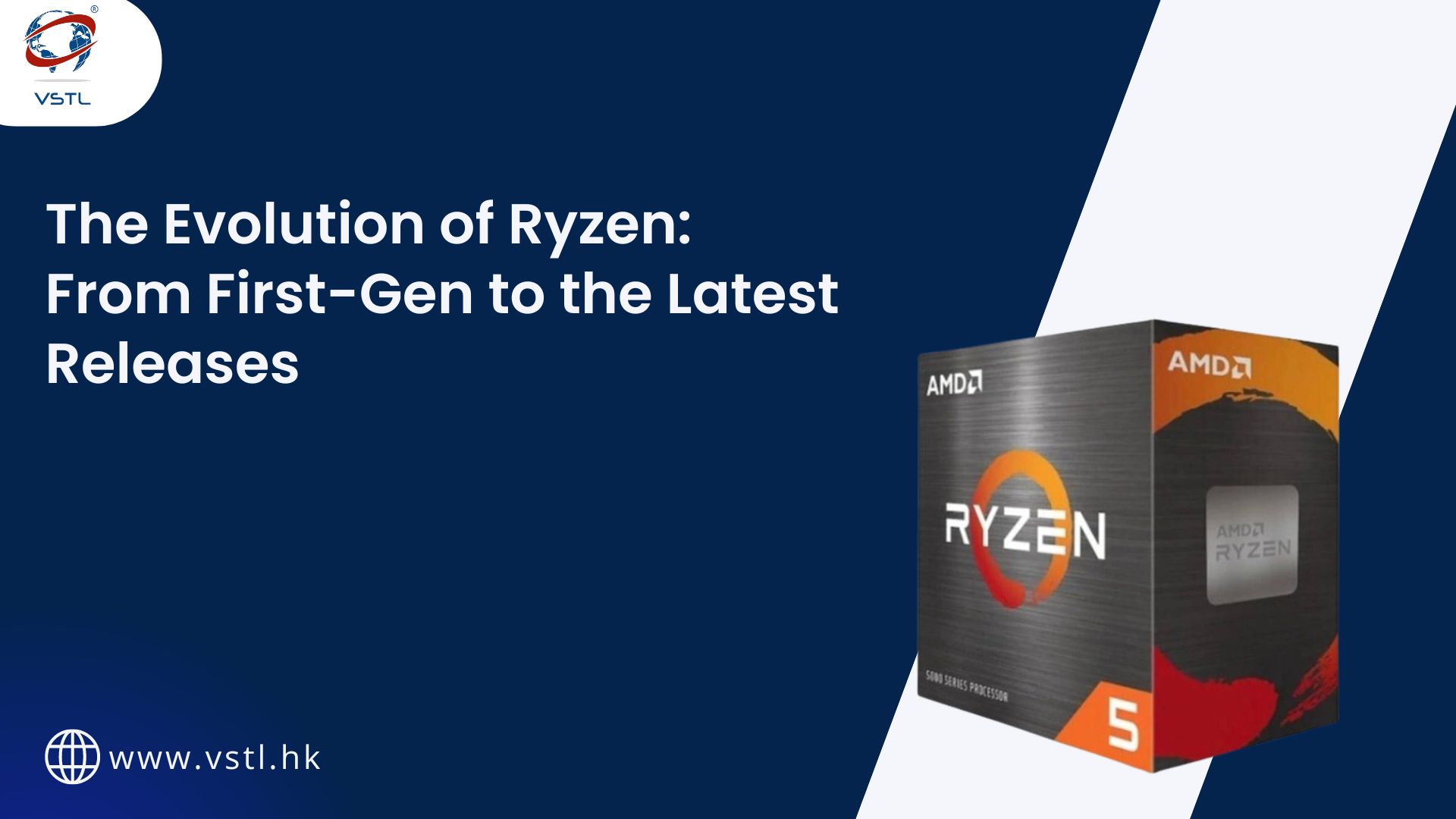
Introduction
AMD’s Ryzen CPUs have transformed the landscape of desktop computing since their debut in 2017. What began as a bold comeback attempt by AMD has grown into a robust and diverse lineup of processors that challenge industry norms and rival established giants. This blog delves into the evolution of Ryzen CPUs, tracing their journey from the original Ryzen series to the latest releases. Whether you’re a tech enthusiast, a gamer, or someone interested in the latest advancements in computing technology, understanding the evolution of Ryzen CPUs provides insight into AMD’s innovation and its impact on the CPU market.
1. The Birth of Ryzen: First-Generation Ryzen CPUs
The AMD Comeback
Before Ryzen, AMD had struggled to compete with Intel’s dominance in the CPU market. The launch of the first-generation Ryzen CPUs in March 2017 marked a significant turning point. Built on the “Zen” microarchitecture, Ryzen CPUs were designed to deliver high performance at a competitive price point. This series included Ryzen 3, Ryzen 5, and Ryzen 7 processors, each catering to different segments of the market.
Key Features and Innovations
- Zen Microarchitecture: The first-generation Ryzen processors were built on the 14nm Zen microarchitecture. This design brought substantial improvements over AMD’s previous architectures, including enhanced instructions per cycle (IPC) and better power efficiency.
- Multithreading Support: Ryzen CPUs introduced Simultaneous Multithreading (SMT), allowing each core to handle two threads simultaneously. This feature improved performance in multi-threaded applications and provided a boost in gaming and productivity tasks.
- AM4 Socket: Ryzen processors utilized the AM4 socket, ensuring future upgradability and compatibility with subsequent generations of AMD CPUs.
Performance and Market Impact
The Ryzen 7 1800X, Ryzen 5 1600X, and Ryzen 3 1200 were notable models from the first generation. These processors competed strongly against Intel’s offerings, offering comparable or superior performance at lower prices. This success helped AMD regain a significant market share and set the stage for future advancements.
2. The Ryzen Refresh: Second-Generation Ryzen CPUs
Improvements and Enhancements
The second-generation Ryzen CPUs, launched in April 2018, introduced several enhancements over their predecessors. These processors were built on an improved 12nm Zen+ architecture, offering better clock speeds and efficiency.
Key Features
- Zen+ Architecture: The Zen+ architecture improved upon the original Zen with higher clock speeds and reduced latency. This resulted in better overall performance and power efficiency.
- Precision Boost 2: This feature enhanced the automatic overclocking capabilities of Ryzen CPUs, providing better performance without manual tuning.
- Enhanced Memory Support: The second-generation Ryzen processors offered improved support for faster memory speeds, which helped boost performance in memory-intensive applications.
Performance and Market Impact
The Ryzen 7 2700X, Ryzen 5 2600X, and Ryzen 3 2300X were standout models from the second generation. These processors continued to build on AMD’s success, delivering competitive performance and further solidifying AMD’s position in the market.
3. The Ryzen 3000 Series: The Third Generation and Beyond
A Major Leap Forward
The third-generation Ryzen CPUs, launched in July 2019, represented a major leap in performance and technology. Built on the 7nm Zen 2 microarchitecture, these processors brought significant advancements in both performance and efficiency.
Key Features
- Zen 2 Architecture: The 7nm Zen 2 architecture brought substantial gains in IPC and power efficiency, resulting in improved gaming and productivity performance.
- PCIe 4.0 Support: For the first time, Ryzen 3000 series CPUs introduced support for PCIe 4.0, offering faster data transfer speeds and enhanced compatibility with next-generation GPUs and storage devices.
- Improved Cache Structure: The third-generation Ryzen processors featured a new cache hierarchy, which improved performance in a variety of applications.
Performance and Market Impact
The Ryzen 9 3950X, Ryzen 7 3800X, and Ryzen 5 3600X were notable releases in this generation. These CPUs offered impressive performance that challenged Intel’s high-end offerings, making AMD a strong contender in both gaming and professional applications.
4. The Ryzen 5000 Series: The Fourth Generation
Redefining Performance
The Ryzen 5000 series, launched in November 2020, marked a significant advancement with the introduction of the Zen 3 microarchitecture. This generation redefined performance standards and showcased AMD’s commitment to innovation.
Key Features
- Zen 3 Architecture: The Zen 3 microarchitecture delivered substantial improvements in IPC, power efficiency, and overall performance. It featured a unified 8-core complex (CCX) design, reducing latency and enhancing performance.
- Better Single-Threaded Performance: Ryzen 5000 series CPUs excelled in single-threaded tasks, making them ideal for gaming and applications requiring high clock speeds.
- Enhanced Compatibility: The Ryzen 5000 series maintained compatibility with the AM4 socket, ensuring users could upgrade without changing their motherboards.
Performance and Market Impact
The Ryzen 9 5950X, Ryzen 7 5800X, and Ryzen 5 5600X were standout models that delivered exceptional performance across various applications. The Ryzen 5000 series established AMD as a leader in high-performance computing and further intensified competition with Intel.
5. The Ryzen 7000 Series: The Latest Releases
Leading-Edge Technology
The Ryzen 7000 series, introduced in late 2022, represents the latest advancement in AMD’s CPU technology. Built on the Zen 4 microarchitecture and manufactured using a 5nm process, these processors push the boundaries of performance and efficiency.
Key Features
- Zen 4 Architecture: The Zen 4 microarchitecture delivers significant improvements in IPC, clock speeds, and power efficiency. It supports DDR5 memory and PCIe 5.0, offering cutting-edge performance and future-proofing.
- AI and Machine Learning: The Ryzen 7000 series incorporates enhanced support for AI and machine learning tasks, making it suitable for advanced applications and workloads.
- Advanced Cooling Solutions: The latest Ryzen CPUs come with improved thermal solutions, including enhanced cooling designs to manage higher performance levels effectively.
Performance and Market Impact
The Ryzen 9 7950X, Ryzen 7 7800X, and Ryzen 5 7600X represent the pinnacle of current Ryzen technology. These processors offer exceptional performance, setting new benchmarks in gaming, content creation, and multi-threaded applications.
6. Ryzen CPUs and Future Trends
Continued Innovation
As AMD continues to innovate, future Ryzen CPUs are expected to focus on further enhancing performance, efficiency, and feature sets. The integration of advanced technologies like AI, machine learning, and improved manufacturing processes will likely play a significant role in the next generations of Ryzen processors.
Competitive Landscape
The ongoing competition between AMD and Intel ensures that consumers will benefit from continued advancements in CPU technology. AMD’s Ryzen CPUs are likely to remain a central player in this dynamic market, driving innovation and pushing performance boundaries.
Conclusion
The evolution of Ryzen CPUs from their first-generation debut to the latest releases illustrates AMD’s remarkable journey of technological advancement and market disruption. Each generation has brought significant improvements in performance, efficiency, and features, making Ryzen CPUs a compelling choice for a wide range of computing needs. As AMD continues to push the envelope with its innovative designs, the future of Ryzen CPUs promises even more exciting developments and advancements.
Understanding the evolution of Ryzen CPUs not only highlights AMD’s achievements but also provides valuable insights into the broader trends and advancements in the CPU industry. Whether you’re considering a new build or simply fascinated by the latest tech developments, the story of Ryzen is a testament to the power of innovation and competition in driving progress.
